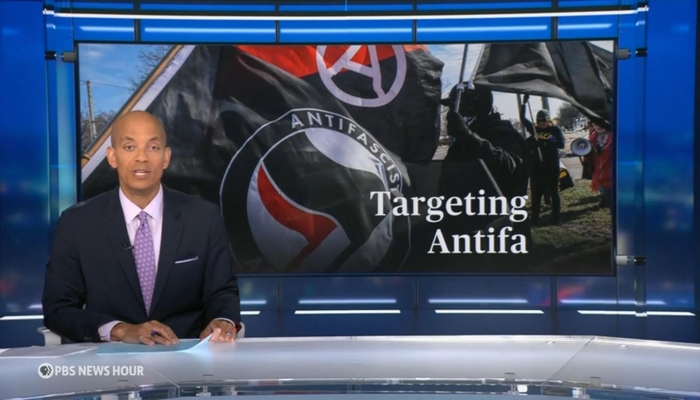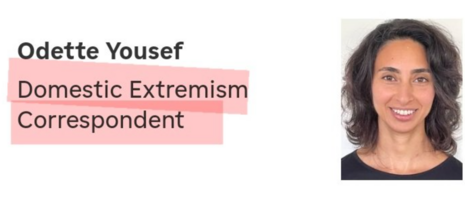


On September 22, President Trump issued an Executive Order designating Antifa as a “domestic terrorism organization.” They’re a violent movement that organizes riots and attacks on law-enforcement authorities, he said, and uses “elaborate means and mechanisms to shield the identities of its operatives, conceal its funding sources and operations in an effort to frustrate law enforcement, and recruit additional members.”
One of those “elaborate means” are the badly named “mainstream media,” who come rushing to the defense of these far-left extremists. Sadly, our “public” broadcasters are some of the most enthusiastic bamboozlers for Antifa.
On the PBS News Hour, anchor Geoff Bennett pushed the “no evidence” lingo: “Top Republicans have been calling for increased scrutiny of Antifa since [Charlie] Kirk's assassination, even though so far the man accused of shooting Kirk has no publicly known link to the movement.”
PBS turned to Luke Baumgartner, a leftist academic who did nothing but dismiss any scrutiny of Antifa, official or unofficial. Bennett asked to define Antifa. He said “their belief system has a fairly wide range of encompassing ideologies, mostly on the political left. And they encompass anarchists, socialists, communists and a lot of people in between there.”
“Mostly on the political left?” There are conservatives or moderates in Antifa? How disingenuous.
It only went downhill from there. Predictably, Bennett asked: “So how is it organized, if at all? Are there actual leaders or networks for the administration to target, or is that just a misconception?” Baumgartner naturally agreed: “No, it's a widely held misconception, especially those who are looking to try and target this idea of Antifa. There is no hierarchical organizational structure. It is primarily a movement and an ideology.”
This is the standard misinformation. You can’t investigate them for anything because they’re not organized, they’re “decentralized,” they’re “amorphous,” they’re exquisitely incapable of being held accountable – if journalists were in the business of holding radical leftist movements accountable.
Baumgartner kept spinning: “And there are no leaders. There are no assets. There are no bank accounts or revenue streams to go after either.”
That’s not true at all. Mia Cathell of the Washington Examiner offered one stream: “Antifa International, an antifascist cohort helping far-left militants connect to local antifa cells or operate their own, is one of the international networks providing material support to antifa operatives in the U.S. by way of its bail fund.” They donated to defending 11 extremists who attacked an ICE facility in Alvarado, Texas in July.
Bennett kept putting tee balls on the tee. “Given all of that, is it a genuine security threat? Is it a political scapegoat, or something in between?” Baumgartner proclaimed: “I would classify it more as a political scapegoat, honestly.” And he added most of the violence comes from the “far right” anyway.
 On NPR’s All Things Considered, anchor Juana Summers turned to “domestic extremism correspondent” Odette Yousef, who came to the defense of domestic Antifa extremists. Summers asked how this Trump terrorism designation might play out. Yousef lamented: “So I'm hearing a real fear that this conflation of anti-fascism and terrorism may stigmatize anyone or any group working on movements for community building and racial or social justice.”
On NPR’s All Things Considered, anchor Juana Summers turned to “domestic extremism correspondent” Odette Yousef, who came to the defense of domestic Antifa extremists. Summers asked how this Trump terrorism designation might play out. Yousef lamented: “So I'm hearing a real fear that this conflation of anti-fascism and terrorism may stigmatize anyone or any group working on movements for community building and racial or social justice.”
Is this woman supposed to investigate domestic extremism, or is she paid to defend it? NPR is all about “stigmatizing” the right-wingers, and worries out loud about rioters for “racial or social justice.” NPR endorsed the book In Defense of Looting and promoted the movie How to Blow Up a Pipeline, so they’re not a reliable source on extremism.
These networks aren’t “public.” They’re anti-public. Taxpayers shouldn't have to support them.
